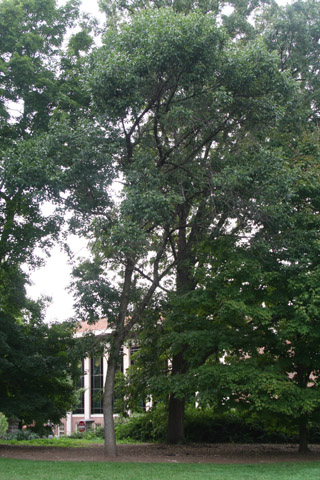
Permanent unique identifier for this particular organism:
http://bioimages.vanderbilt.edu/vanderbilt/12-167
Notes:
This tree is in the northwest corner of Magnolia Lawn and borders the open grassy area.
This tree illustrates the bark of a fairly large tree. However, it has no branches near the ground. A large white ash tree nearby on the other side of 21st Ave. S. has branches near to the ground if you would like to get a closer look at the leaves.
This tree illustrates the bark of a fairly large tree. However, it has no branches near the ground. A large white ash tree nearby on the other side of 21st Ave. S. has branches near to the ground if you would like to get a closer look at the leaves.
 |  |
Load database and switch to thumbnail view
Use this stable URL to link to this page:
http://bioimages.vanderbilt.edu/vanderbilt/12-167.htm
This organism is a living specimen that is part of the Vanderbilt University Arboretum with the local identifier 1-734.
This particular organism is believed to have managedmeans of establishment.
This organismal entity has the scope: multicellular organism.
Remarks:No longer extant in 2024.
Identifications:
Fraxinus americana
L.
sec. Gleason Cronquist 1991
common name: white ash
family: Oleaceae
Identified 2014-09-11 by Steven J. Baskauf
Location:
north side of Magnolia Lawn, Vanderbilt University, Nashville, Davidson County, Tennessee, US
Click on these geocoordinates to load a map showing the location: 36.14376°, -86.79883°
Coordinate uncertainty about: 10 m.
Location of individual determined from GIS database.
Occurrences were recorded for this particular organism on the following dates:
2014-09-11
The following images document this particular organism.
Click on a thumbnail to view the image and its metadata.Load database and enable navigation by taxon and organism.
| Image | View |
 | whole tree (or vine) - general |